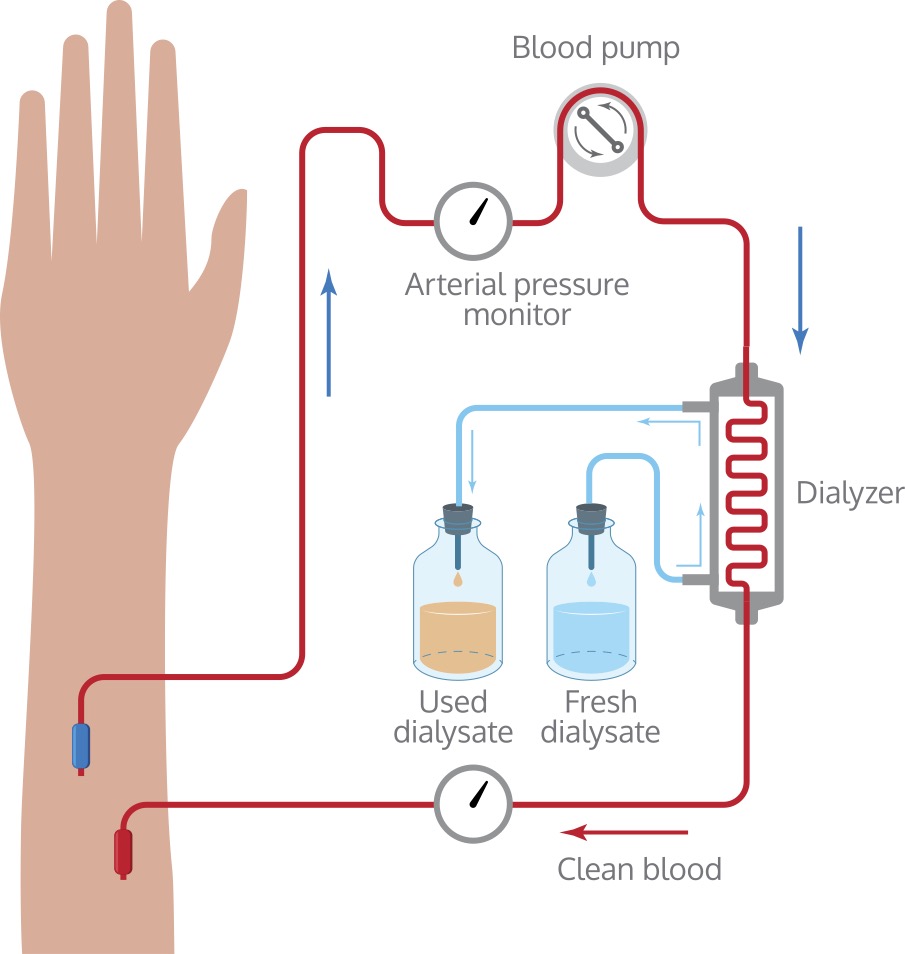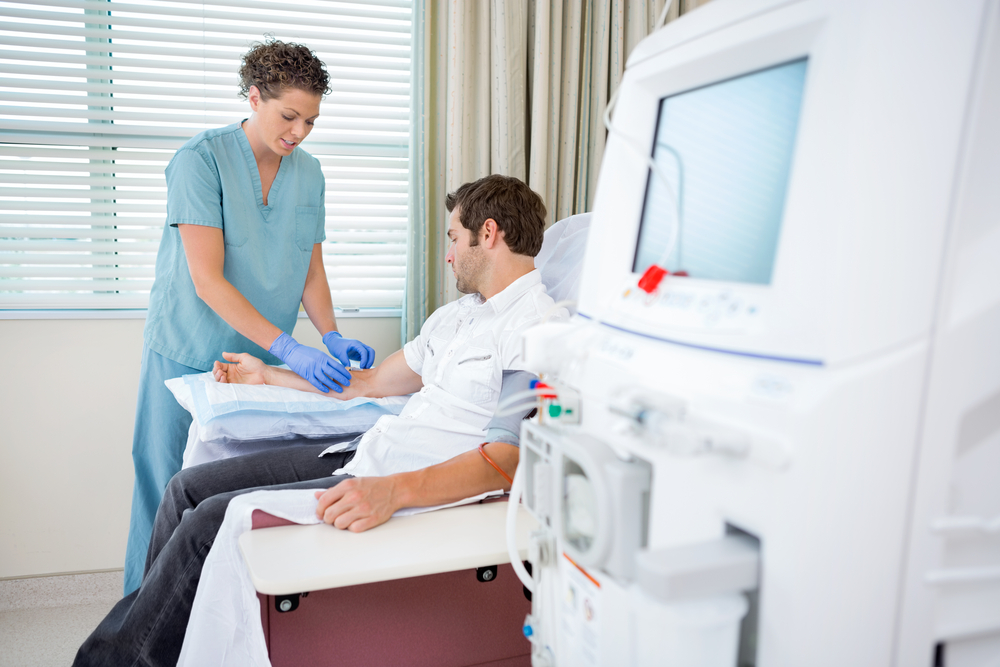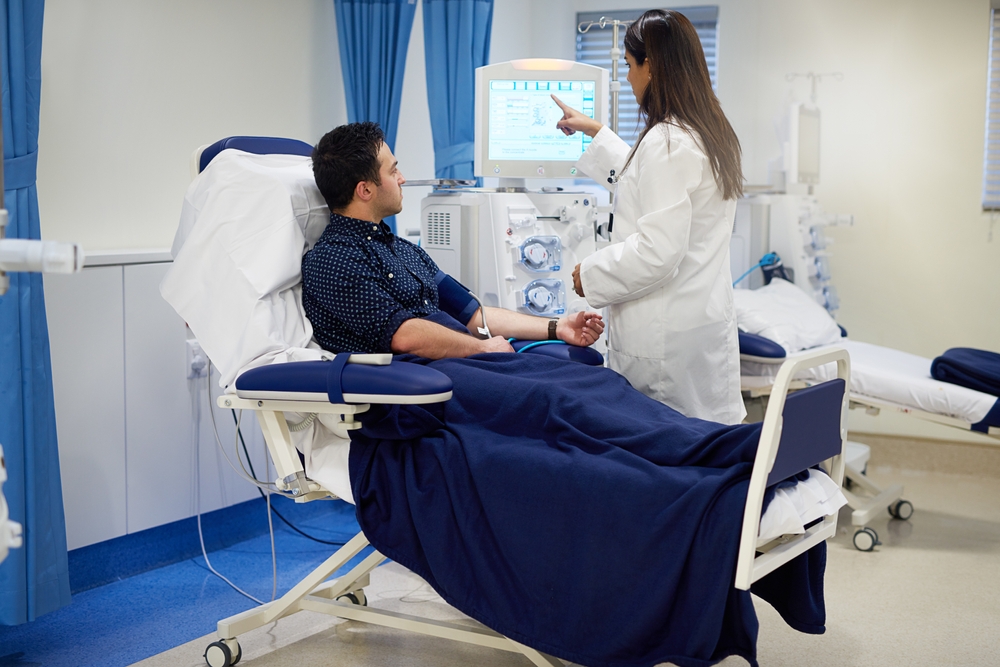Dialysis Access Management

What Is Dialysis Access Management?
VASCULAR ACCESS (OR HEMODIALYSIS) IS A WAY TO REACH THE BLOOD FOR HEMODIALYSIS
Hemodialysis is a type of treatment for kidney failure (end-stage kidney disease or ESRD). It uses a machine that holds a filter called a dialyzer. As blood flows through the dialyzer, waste is removed and fluid and chemicals are balanced.
Hemodialysis treatments are usually done at a special dialysis center. In some cases, treatments may be done at home. As the kidney failure is getting worse, your doctor may advise you to have an access port placed by a surgeon into one of your arms ahead of time. This access may take several weeks to mature before it can be used for hemodialysis.
What is Dialysis?
Dialysis is a treatment that performs the work of the kidneys when they are no longer able to function properly. Healthy kidneys remove waste products, extra fluid, and toxins from the blood. When kidney function drops to a critical level, dialysis helps filter the blood to keep the body in balance.
There are two main types of dialysis:
- Hemodialysis: Blood is filtered through a machine outside the body and returned clean.
- Peritoneal dialysis: The lining of your abdomen acts as a filter using a special dialysis solution.
For patients starting hemodialysis, creating and maintaining reliable vascular access, such as a fistula, graft, or catheter, is a critical first step to ensure effective treatment.

HOW HEMODIALYSIS IS DONE
Two needles are inserted into a blood vessel (called an arteriovenous fistula or AV fistula) or an arteriovenous graft (or AV graft), usually in your arm. Each needle is attached to a tube. One tube carries your blood into the dialyzer, where it’s cleaned. Clean blood returns to your body through a second tube and needle. If this treatment has to be done in an emergency, a plastic tube (catheter) is inserted into a large vein, typically in the neck or groin. This catheter helps carry blood to and from the dialysis machine.
YOUR EXPERIENCE: PROBLEMS TO WATCH FOR
- Hemodialysis usually takes about 3 to 5 hours. It’s usually done 3 times a week.
- You’ll have a regular schedule for your hemodialysis. Many centers have evening and weekend hours as well as weekday hours to help you continue working. Some centers also offer overnight treatments.
- A trained nurse or technician connects you to the dialysis machine. He or she watches for problems and makes sure you are comfortable.
- During treatment, only a small amount of blood (about 1 cup) is out of your body at any one time.
During your treatments, you may have a headache, muscle cramps, nausea and vomiting, chest and back pain, itching, and fever and chills. Make sure you tell your nurse or technician if you have any of these symptoms.
Some people are able to learn to use dialysis at home. Home dialysis lets you schedule treatments when it’s most convenient. You may have more frequent treatments, but for shorter periods of time. You may also do overnight treatments.
What to Expect from Dialysis Access Care
At The Surgical Clinic, we guide you through every stage of your dialysis access journey:

- Initial Consultation: You’ll meet with one of our vascular surgeons to discuss your health history, dialysis needs, and the best type of access for you.
- Access Creation: We perform your procedure, whether it’s an AV fistula, graft, or catheter placement, using advanced techniques to ensure safety and long-term function.
- Recovery & Maturation: After surgery, your access needs time to heal and, in the case of fistulas, to mature before use. Our team will provide instructions for recovery and follow-up visits.
- Ongoing Management: We monitor your access for complications such as clotting, narrowing, or infection, and provide treatments when needed to keep it working properly.
- Long-Term Support: Our team partners with you and your dialysis center to make sure your access continues to function effectively for years to come.
With expert care and regular monitoring, you can count on reliable access to support your dialysis treatments.
Preparing for your Access Surgery
When preparing for the placement of an AV fistula, graft, or catheter, we will provide you with pre-operative instructions. Such instructions could include fasting, arrangement of transportation, and reviewing medication schedules leading up to surgery.
Lifestyle Tips for Protecting Your Access
It is important to protect dialysis access to ensure an effective procedure. To maintain a clean site, practice good hygiene and avoid wearing tight clothing. Unless necessary, try to avoid blood pressure readings and practice sleeping in a position that does not compress the access site.
Common complication of Dialysis Access
It’s beneficial for patients to be prepared for possible side effects of dialysis. The most common side effects include: muscle cramps, low blood pressure, and fatigue. Muscle cramps can be caused by mineral imbalances. Low blood pressure can result in feeling dizzy due to rapid fluid removal. Fatigue can be caused by a multitude of factors such as fluid shifts or emotional distress from procedure.
MANAGING AND LOWERING YOUR RISK OF DIALYSIS SIDE EFFECTS
Everyone’s experience with dialysis is unique, and while side effects can sound daunting, there are practical steps you can take to lower your risk:
- Communicate openly with your care team: Let your doctor, nurse, or dialysis technician know right away if you notice any changes or feel unwell during or after treatment. The earlier you share your concerns, the easier it is to adjust your care.
- Follow your treatment plan: Stick to your recommended dialysis schedule, take medications as prescribed, and arrive at your sessions on time. Consistency helps your body adjust and reduces complications.
- Watch your diet and fluids: Work with a dietitian who specializes in kidney care (often called a renal dietitian) to maintain a diet tailored to your needs. Controlling sodium, potassium, and fluids can make a big difference in your comfort and long-term health.
- Take care of your access site: Check your fistula or graft daily for redness, swelling, or pain and keep the site clean. If you notice changes, notify your care team as soon as possible.
- Stay active: Gentle physical activity, cleared by your doctor, can help reduce fatigue and muscle cramps. Even walking or stretching can make treatments easier to tolerate.
- Educate yourself: The more you know about dialysis and your own health, the more confident you’ll feel about handling side effects and making informed choices.
Remember, while side effects are possible, untreated kidney failure comes with much greater risks. By staying informed and engaged in your own care, you can make your dialysis journey safer and smoother.
Recovering From Dialysis
Directly after dialysis access, expect mild soreness, swelling, or bruising around the access site. This is likely to last for a few days to two weeks. Talk with your surgeon about incorporating a new physical activity plan in your routine. Although some physical activity is recommended, avoid intense workouts and lifting heavy objects. Your team will provide you with detailed instructions to ensure the most effective and efficient recovery.
When to Talk to Your Doctor
Get immediate medical help or call your doctor, nurse or dialysis technician if you have any of these symptoms after treatment:
- Chest or back pain
- Tiredness (fatigue)
- Bleeding from the needle site
- Shortness of breath
- Fever or chills
- Headache or lightheadedness
- Nausea or vomiting
- Itching
- Muscle cramps
- Pain, warmth, or redness at your access site
- Inability to feel your blood flow (called a thrill) in your AV fistula or graft
Take the Next Step Toward Reliable Dialysis Access
Your dialysis access is your lifeline, and it deserves expert care. At The Surgical Clinic, our board-certified vascular surgeons specialize in creating and maintaining fistulas, grafts, and catheters to keep your treatments safe and effective.
Frequently Asked Questions
How long can you be on dialysis for?
Some patients live on dialysis for many years, especially if they are not eligible for a kidney transplant. How long a person can remain on dialysis depends on several factors, including overall health, age, and the presence of other medical conditions. With proper care and consistent treatment, many patients maintain a good quality of life.
Is it painful to be on dialysis?
Dialysis itself is not usually painful, though you may feel some discomfort from the needle insertions during hemodialysis. Fatigue or muscle cramps can occur but often improve with regular treatments and good management.
Can you live a normal life while on dialysis?
Many people are able to continue working, traveling, and participating in daily activities while on dialysis. Although adjustments to your schedule, diet, and fluid intake are often necessary, dialysis can be successfully integrated into everyday life with planning and support from your healthcare team.
What is the definition of dialysis?
Dialysis is a medical treatment that removes waste products and excess fluid from the blood when the kidneys cannot perform these functions on their own.
How to prepare for kidney dialysis?
Preparation often involves lifestyle changes, dietary adjustments, and the creation of vascular access for hemodialysis. Your doctor will guide you through lab tests, imaging, and access placement before starting treatment.
How does kidney dialysis work?
In hemodialysis, blood is drawn from your body, filtered through a dialysis machine, and returned clean. In peritoneal dialysis, a cleansing solution fills the abdomen, drawing waste out through the lining of the abdominal cavity.
What are the side effects of kidney dialysis?
Side effects can include fatigue, low blood pressure, nausea, or cramps. Over time, many patients adapt to treatments and find symptoms manageable.
When is kidney dialysis needed?
Dialysis is needed when chronic kidney disease progresses to kidney failure and the kidneys can no longer effectively remove waste and fluid.
What are the alternatives to kidney dialysis?
The main alternative is a kidney transplant, which may offer a more permanent solution. For some patients, medical management of kidney disease is an option until a transplant or dialysis becomes necessary.
VASCULAR SURGEONS AT THE SURGICAL CLINIC

Dr. Thomas Beazley
Vascular Surgeon
VIEW PROFILE

Dr. Julia Boll
Vascular Surgeon
VIEW PROFILE

Dr. JimBob Faulk
Vascular Surgeon
VIEW PROFILE

Dr. Brian Kendrick
Vascular Surgeon
VIEW PROFILE

Dr. Billy J. Kim
Vascular Surgeon
VIEW PROFILE

Dr. Allen Lee
Vascular Surgeon
VIEW PROFILE

Dr. Caroline Nally
Vascular Surgeon
VIEW PROFILE

Dr. Elizabeth F. Nelson
Vascular Surgeon
VIEW PROFILE

Dr. Adam Richter
Vascular Surgeon
VIEW PROFILE

Dr. Mark Shelton
Vascular Surgeon
VIEW PROFILE

Dr. Todd H. Wilkens
Vascular Surgery
VIEW PROFILE

Dr. Patrick Yu
Vascular Surgeon
VIEW PROFILE
VASCULAR SURGERY ARTICLES
Common Vein Conditions and Effective Treatments
Sometimes, leg pain and swelling are caused by...
Aortic Aneurysms: When to Monitor and When Surgery is Necessary
Heart disease is the leading cause of death in...
Vein Pain: Solutions for Varicose Veins
Many people don’t associate veins with pain, but...
Top Docs at The Surgical Clinic
Celebrating The Surgical Clinic’s Top Docs...
Stroke Prevention: A Comprehensive Guide | B.F.A.S.T.
Strokes can be devastating, often leaving...
Vascular Surgery: How Vascular Conditions Are Diagnosed And Treated
Seeking clarity on vascular surgery how vascular...





